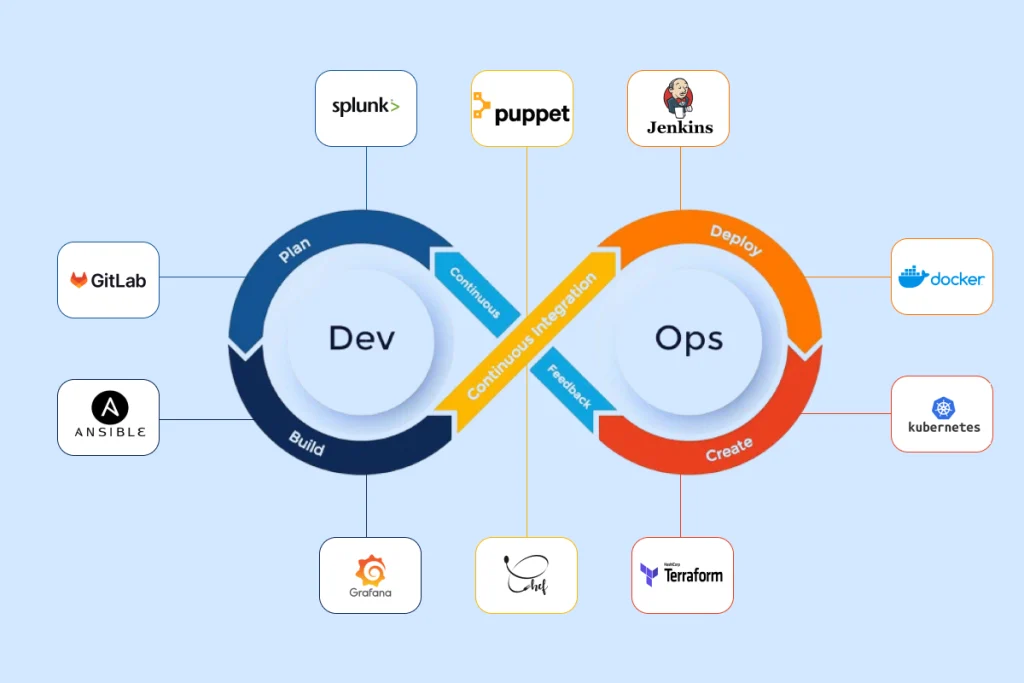DevOps has revolutionized the way software is developed, deployed, and maintained. By bridging the gap between development and operations teams, DevOps enables faster delivery, improved collaboration, and higher-quality software. But to truly excel in DevOps, you need the right tools in your arsenal. As we look ahead to 2025, the DevOps landscape continues to evolve, with new tools and technologies emerging to meet the demands of modern software development. Whether you’re a seasoned DevOps professional or just getting started, here are the top 10 DevOps tools you need to know in 2025.
You read in this article:
Top 10 DevOps Tools in Action
DevOps isn’t just a buzzword—it’s the backbone of modern software development. By combining development and operations, DevOps helps teams deliver faster, collaborate better, and build more reliable systems. But to truly harness its power, you need the right tools.
In this article, we’re diving into the top 10 DevOps tools you need to know in 2025. These tools are shaping the future of software delivery, and we’ll show you how they work in action. Whether you’re a startup or an enterprise, these tools can help you streamline your workflows, boost efficiency, and stay ahead of the curve. Let’s get started!
1. Kubernetes
Kubernetes has become the de facto standard for container orchestration, and its importance is only growing. In 2025, Kubernetes will continue to dominate as organizations increasingly adopt microservices and cloud-native architectures.
Why it matters:
- Automates deployment, scaling, and management of containerized applications.
- Supports multi-cloud and hybrid cloud environments.
- Offers a robust ecosystem of plugins and integrations.
Pro Tip: Pair Kubernetes with Helm for easier application management and deployment.
2. Jenkins
Jenkins remains a cornerstone of CI/CD pipelines, and its open-source nature makes it a favorite among DevOps teams. With a vast library of plugins, Jenkins integrates seamlessly with almost every tool in the DevOps ecosystem.
Why it matters:
- Enables continuous integration and continuous delivery (CI/CD).
- Highly customizable and extensible.
- Strong community support and regular updates.
Pro Tip: Use Jenkins pipelines-as-code to define your CI/CD workflows in a version-controlled manner.
3. Terraform by HashiCorp
Infrastructure as Code (IaC) is a key DevOps practice, and Terraform is the go-to tool for defining and provisioning infrastructure across multiple cloud providers.
Why it matters:
- Supports multi-cloud infrastructure management.
- Ensures consistency and repeatability in infrastructure deployment.
- Integrates with tools like Kubernetes, AWS, and Azure.
Pro Tip: Use Terraform Cloud for collaborative infrastructure management and state file storage.
4. Docker
Docker revolutionized containerization, and it remains a critical tool for DevOps teams. By packaging applications and their dependencies into lightweight containers, Docker ensures consistency across development, testing, and production environments.
Why it matters:
- Simplifies application deployment and scaling.
- Works seamlessly with Kubernetes and other orchestration tools.
- Reduces “it works on my machine” issues.
Pro Tip: Optimize your Docker images by using multi-stage builds to reduce image size.
5. GitLab
GitLab is more than just a version control system—it’s a complete DevOps platform. From source code management to CI/CD and monitoring, GitLab offers an all-in-one solution for DevOps teams.
Why it matters:
- Combines Git repositories, CI/CD, and DevOps tools in one platform.
- Offers built-in security and compliance features.
- Supports both cloud and self-hosted deployments.
Pro Tip: Use GitLab’s Auto DevOps feature to automate your entire software delivery process.
Cloud VPS Hosting vs. Dedicated Servers: Key Differences and Which One to Choose
by Raphael S
6. Prometheus
In Top 10 DevOps Tools we must mention Prometheus. Monitoring and observability are critical for maintaining system reliability, and Prometheus is a leading tool for monitoring containerized environments.
Why it matters:
- Provides real-time metrics and alerts.
- Integrates seamlessly with Kubernetes.
- Offers a powerful query language (PromQL) for data analysis.
Pro Tip: Pair Prometheus with Grafana for stunning visualizations and dashboards.

7. Ansible
Automation is at the heart of DevOps, and Ansible is one of the most popular tools for configuration management and automation.
Why it matters:
- Uses simple YAML syntax for defining automation tasks.
- Agentless architecture makes it easy to set up and use.
- Supports a wide range of modules for different use cases.
Pro Tip: Use Ansible Playbooks to automate repetitive tasks and ensure consistency across environments.
8. GitHub Actions
GitHub Actions has emerged as a powerful CI/CD tool that integrates directly with GitHub repositories. It’s perfect for teams already using GitHub for version control.
Why it matters:
- Enables seamless CI/CD workflows within GitHub.
- Offers a marketplace of pre-built actions for common tasks.
- Supports both Linux, Windows, and macOS environments.
Pro Tip: Use reusable workflows to standardize CI/CD processes across multiple repositories.
9. Selenium
Testing is a critical part of the DevOps lifecycle, and Selenium remains a top choice for automated testing of web applications.
Why it matters:
- Supports multiple programming languages (Java, Python, C#, etc.).
- Works across different browsers and platforms.
- Integrates with CI/CD tools like Jenkins and GitLab.
Pro Tip: Use Selenium Grid for parallel testing to speed up your test cycles.
10. Spinnaker
Spinnaker is a powerful continuous delivery platform designed for multi-cloud environments. It’s particularly well-suited for organizations with complex deployment needs.
Why it matters:
- Supports advanced deployment strategies like canary and blue-green deployments.
- Integrates with cloud providers like AWS, GCP, and Azure.
- Provides a unified interface for managing deployments.
Pro Tip: Use Spinnaker’s pipeline templates to standardize deployment processes across teams.
Your Next Steps
The world of DevOps is always changing, and keeping up with the latest tools and practices can feel like a full-time job. While this Top 10 DevOps Tools we’ve talked about are essential for building and deploying modern software, getting everything set up and running smoothly isn’t always easy—especially for startups and businesses that are already juggling a million things.
That’s where Centerglo steps in. Think of us as your DevOps partner, here to make your life easier. Whether you’re a startup trying to get off the ground or a growing business looking to scale, we’ve got the expertise to help you succeed.
Here’s why you’ll love working with Centerglo:
- We keep it simple: No tech jargon, no headaches—just clear, effective solutions that work for you.
- We’ve got your back: From setting up CI/CD pipelines to managing your cloud infrastructure, we handle the heavy lifting so you can focus on your business.
- We’re budget-friendly: Our services are designed to give you the most value without stretching your wallet.
- We’re future-ready: We stay on top of the latest trends and tools, so your DevOps practices are always ahead of the curve.
Ready to make DevOps work for you? Let Centerglo take care of the tech while you focus on what you do best—growing your business. Get in touch with us today, and let’s build something amazing together!
For more details, you can check out this article on redhat







